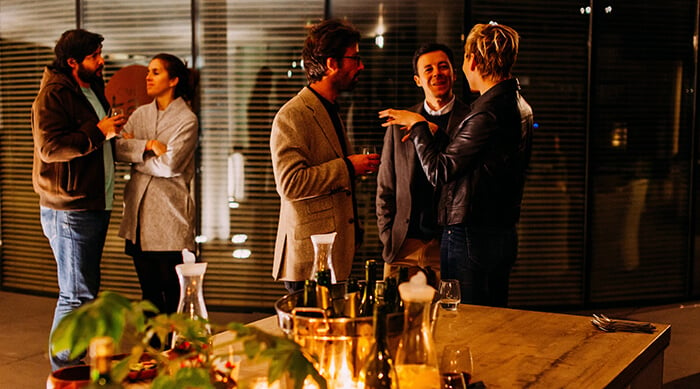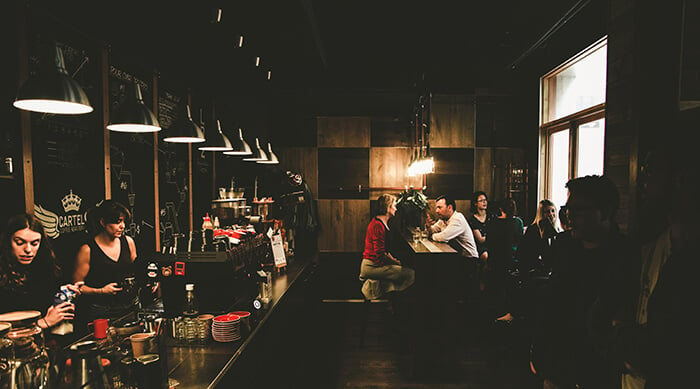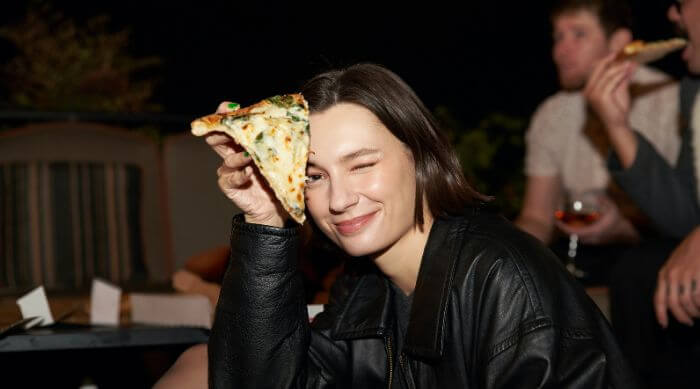Sober curious is a cultural movement of people who give up drinking — not in response to addiction, but for health or other personal reasons. A lot of people never give up drinking completely while practicing a sober curious lifestyle.
This inclusive movement welcomes anyone who is not willing, ready, or prepared to give up the sauce quite yet.
It does not have to be a bummer to stop drinking. (We know it sounds crazy, but hear us out.)
First off, there are all sorts of fun mocktails and non-alcoholic drinks you can still try.
Second, there are a ton of health benefits to not drinking, like a stronger immune system, heart health, and improved sexual function.
Third, giving up some or all of your drinking might actually prevent a few binges from developing into an addiction.
Non-Alcoholic Sparkling Rosé Can 4-Pack
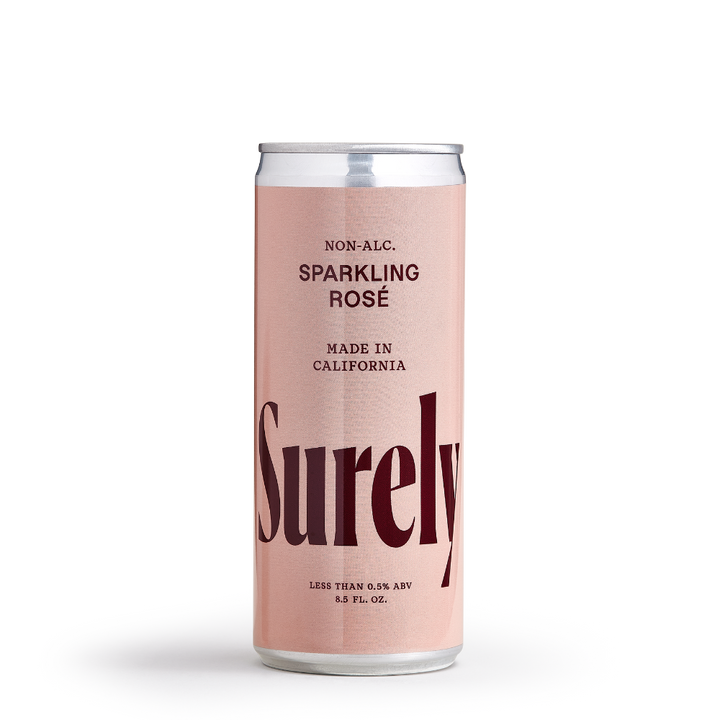
$24.99
Dry non-alcoholic California sparkling rosé with crisp, light notes of strawberry, peach & raspberry. Rosé all day without the hangover.TASTING NOTES: Flavors of soft strawberry, peach, and raspberry notes are balanced with a light acid for a full finish. FOOD… Read More
To put things in perspective: During the pandemic, alcohol sales and consumption reached record highs, with a spike in alcohol-related deaths. In the wake of lockdowns, alcoholism is still a legitimate public health concern.
Perhaps this harsh reality is one reason so many people are now consider a zero-proof social life.
If you haven’t already, grab some of Surely’s alcohol-removed rosé to help you ease into your sober curious journey. Our unique proprietary process ensures you get that sophisticated, crisp rosé taste without any of the guilt.
Without further ado, read this article and learn all you need to know about sober curiosity.
Table of Contents
What does being “sober curious” mean?
A Brief History of Sober Curiosity
8 Health Benefits of a (More) Sober Life
6 Tips for a Successful Sober Curious Life
What does being “sober curious” mean?
Being sober curious means you are starting to rethink how much you drink. (Think: mindful drinking.) Many choose to quit drinking altogether, but not every sober curious person does so.
Maybe you don’t drink as much as those around you or you avoid drinking every day. Or perhaps you’re just curious about the surprising health benefits of abstinence.
What is the sober curious movement? The sober curious movement is an inclusive cultural movement promoting reduced alcohol consumption. The sober curious movement welcomes people who are not yet ready, willing, or planning to abstain from alcohol.
Does being sober mean you never drink? No, being sober means you are not currently drunk or buzzed. Sometimes, people will say they are “sober” to mean that they never drink, but this is not the only definition.
Beware: It is dangerous to say, “I’ve had a few drinks, but I’m sober,” especially when it comes to driving or taking medication. Your blood alcohol content may say otherwise.
What is the difference between sober curious and a sober lifestyle? A sober curious lifestyle means you’re interested in cutting back, while a sober lifestyle means you abstain from alcohol altogether.
A Brief History of Sober Curiosity
Throughout history, alcohol consumption has been the norm. We celebrate sporting events, mark special occasions, and weather difficult seasons of life with beer, champagne, and wine. Many people think it odd for people to remain soberunless they have a religious or health-related reason to do so (or a history of alcoholism).
Dry January, Sober September, and Sober October have all encouraged people to reevaluate their alcohol use for several years.
However, the term “sober curious” can be most attributed to Ruby Warrington, who wrote Sober Curious: The Blissful Sleep, Greater Focus, Limitless Presence, and Deep Connection Awaiting Us All on the Other Side of Alcohol in 2018. (It’s available on Amazon.)
In Warrington’s book, she discusses avoiding daily drinking, never drinking more than those around you, and making sure your drinking does not hurt those close to you. (Check out Warrington’s enlightening and uplifting Sober Curious podcastfor more!)
Health trends around sobriety certainly aren’t new. The Temperance Movement of the 19th century promoted abstinence from hard liquor in particular. But in 1833, Richard Turner coined the term “teetotaler” referring to those who practiced “total temperance,” as in abstaining from all alcohol, not just hard liquor.
Along those lines, the New York Times bestseller, Quit Like a Woman: The Radical Choice to Not Drink in a Culture Obsessed with Alcohol by Holly Whitaker blew up on social media after Chrissy Teigen said it helped her become sober.
Since then, various popular figures have chosen to abstain from alcohol or encouraged others to stay sober.
What other celebrities are sober? Many celebrities and influencers have chosen to remain sober, including:
- Zac Efron
- Samuel L. Jackson
- Naomi Campbell
- Elton John
- Natalie Portman
- Keith Urban
- Demi Lovato
- Shania Twain
- Bradley Cooper
Some of them stepped away from alcohol after recovering from alcohol addiction, but many have simply given up drinking (or never started) because they prefer a sober lifestyle. If you choose to go sober or sober curious, you are joining an extensive family of famous people who have chosen to go the same way.
Non-Alcoholic Sparkling Brut
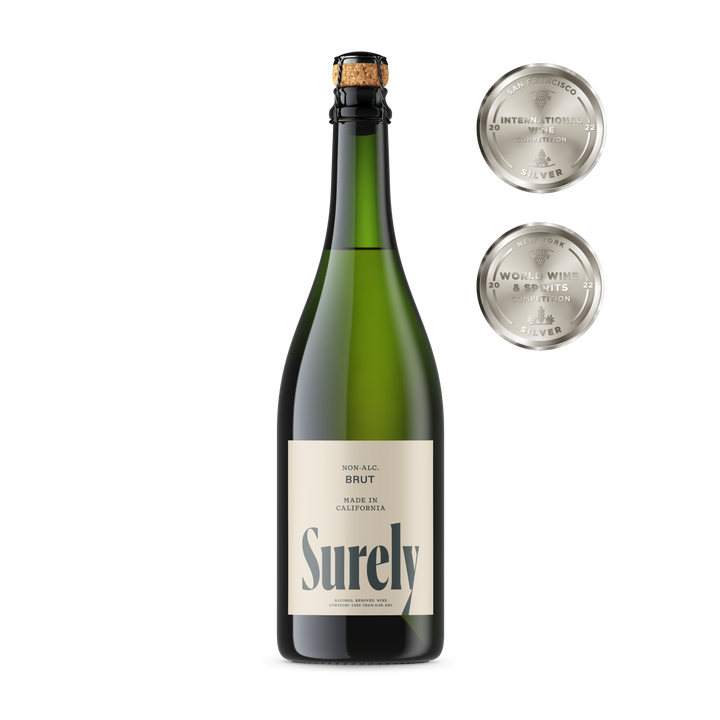
$24.99
Award-winning alcohol-removed bubbly white. Hints of apple, pear, honey and citrus notes. Better than champagne.TASTING NOTES: The vibrant combination of apple, pear, honey and citrus notes intertwined with a crisp backbone. The acid and sweet notes of the fruit pair… Read More
8 Health Benefits of a (More) Sober Life
Is being sober curious a good idea for me? Sober curiosity is a great idea for anyone who doesn’t struggle with alcohol addiction. Cutting back your alcohol intake is always a healthy choice.
You may be shocked to know that there are lots of benefits to your health and well-being, besides not feeling hungover the morning after. Cheers to better overall wellness! 🥂
- Liver health: Your liver will thank you when you stay off the drink for a while. Cirrhosis of the liver may occur in individuals who drink to excess.
- Stronger immune system: Many around the world are understandably concerned with their immune health. Binge drinking, even occasionally, can wreck your immune system. Laying off the bottle can make it easier to fight off infection.
- Less drinking afterward: Even if you only go sober for a month, such as for Sober September, studies show that individuals drink less after that short period of sobriety is finished. Since a quarter of adults participate in heavy drinking or binge drinking each month, it is worth looking into sober curiosity to curb those heavy drinking habits.
- Better sleep: Many people find a glass of wine helps them sleep. However, this is an illusion. The more you drink at night, the less REM sleep you get. This can lead to feeling crappy in the morning. Abstaining from those nightcaps might show you what high-quality sleep feels like.
- Weight loss: A lot of alcoholic drinks contain beaucoup (translation: a whole heck of a lot of) calories. Cutting out these calories can help you lose weight — obviously. However, moderate drinkers are unlikely to see much improvement in weight when they abstain. This one’s mainly for heavier drinkers. By the way, heavy drinking as a young adult increases the likelihood of overweight/obesity by 41%.
- Improved heart health: Drinking less may help lower high blood pressure and reduce the overall risk of heart disease.
- Reduced cancer risk: About 4% of cancer deaths are alcohol-related. The Department of Health and Human Services lists alcohol as a known human carcinogen. It makes sense that sober curiosity may reduce your risk of cancer. Even though females get intoxicated faster, men account for more alcohol-related cancer cases.
- Sexual function: Alcohol can lead to erectile dysfunction, decreased vaginal wetness, delayed male ejaculation, and other sexual dysfunctions. Going sober can prevent these vibe-killing issues.
The only genuine health risk to going sober curious, even for a short time, is probably withdrawal side effects, in which case you may suffer from alcohol use disorder.
6 Tips for a Successful Sober Curious Life
- Take up meditation. Prayer, mindfulness, and reading are great examples of quiet time that not only fills the time when you could be thinking about alcohol, these all reduce stress levels. Bonus points for being outside in green spaces.
- Replace alcohol with alcohol-free alternatives and cocktails with mocktails. Surely offers alcohol-removed rosé that tastes like the real thing. Other brands are pioneering non-alcoholic beers and alcohol-free spirits. Plus, the internet is full of thousands of online recipes for delicious mocktails.
- Go to a sober bar. They are popping up everywhere around the world, offering sober and sober curious individuals the opportunity to go out without temptation. As an Illinois sober bar founder argued in 2013, “You can only go to the movie theater and bowling alley so many times.” There are also popular sober bars in New York City and Austin, Texas.
- Get your friends on the bandwagon. Not only would you be doing your friends a favor (re: health benefits), but it makes your journey easier too. (It’s okay to be a little selfish.) Not to mention, half of American millennials are reducing their alcohol consumption, according to recent studies. You are not alone. It’s trendy, we promise.
- Find social situations and spaces where alcohol is not the focus. Connecting with like-minded people can help you feel less alone.
- Create a plan. Write down your specific goals and unique reasons why it is good to get alcohol out of your life. Knowing your target helps you aim in the right direction.
Why “Sober Curious” Isn’t Right for Alcoholics
For those struggling with alcoholism, sober curiosity is not the right step. If you are dealing with alcohol use disorder, there are several immediate steps you can take to find the support you need for your journey to recovery.
Specifically, sober curious people don’t necessarily stay away from alcohol in all forms. This is one of the key parts of alcohol abuse recovery that doesn’t jive with a simple curiosity.
Contact these support groups right away if you need help with alcoholism/alcohol abuse:
- Substance Abuse and Mental Health Services Administration 800-662-4357
- Alcoholics Anonymous
- Various local wellness centers that may take your insurance
Criticisms of Sober Curiosity
The sober curious movement is not for everyone, especially those who struggle with alcohol use disorder.
Some critics complain that the sober curiosity trend trivializes the complex recovery process that so many have to go through their entire lives.
Many experts consider alcohol use disorder a spectrum, not a binary on-or-off condition. For some, it may not be so obvious that they have a drinking problem, making temporary breaks from alcohol a tempting alternative to seeking professional support and totally abstaining from alcohol.
Also, make sure you don’t give up alcohol just to replace it with drugs or other substances.
On a lighter note, going sober curious is cause for celebration, but your friends do not want to hear you talk about it every single time you see them.
There is nothing wrong with exploring sober curiosity for the wellness benefits and circumventing silly peer pressure. But the sober curious culture is not meant to minimize the struggles of people on the alcohol use disorder spectrum.
Ready to start your alcohol-free life?
Whether it is short-term or for the rest of your life, you can start your alcohol-free (or more sober) life with the sober curious movement.
To be sober curious is a valid wellness choice that can help you reevaluate your relationship with drinking alcohol. Whether it’s just for Sober October or Dry January, or if it’s the next stage in your life, there are so many people out there who are eager to support new members of this healthy trend.
And don’t forget. Surely’s non-alcoholic rosé is the perfect way to maintain your sober curiosity.
$24.99
Award-winning non-alcoholic California sparkling rosé with crisp, light notes of strawberry, peach & raspberry. Rosé all day without the hangover.TASTING NOTES: Flavors of soft strawberry, peach, and raspberry notes are balanced with a light acid for a full finish.FOOD PAIRINGS:… Read MoreNon-Alcoholic Sparkling Rosé
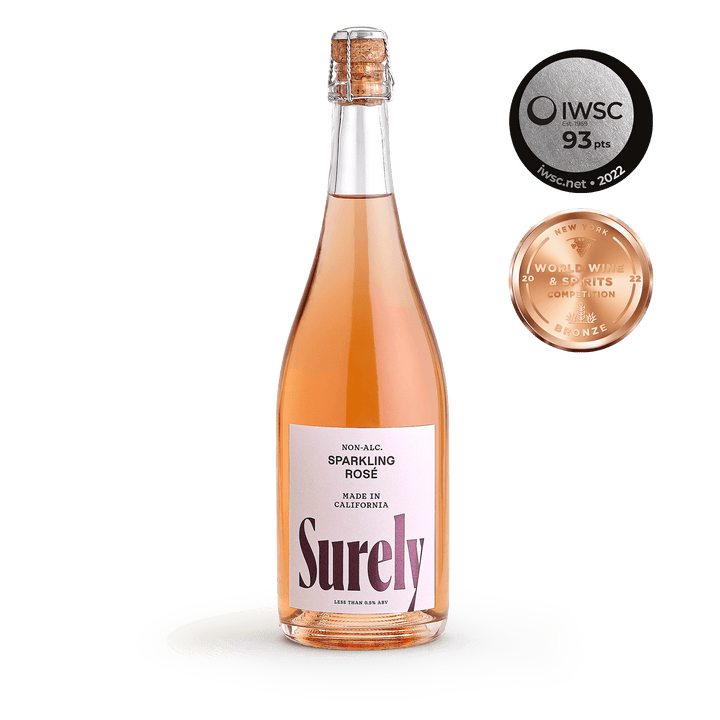
Sources
- Alcohol Consumption during the COVID-19 Pandemic: A Cross-Sectional Survey of US Adults
- Alcohol and the Immune System. Alcohol Research : Current
- Voluntary temporary abstinence from alcohol during "Dry January" and subsequent alcohol use
- Alcohol and sleep I: effects on normal sleep
- Heavy Drinking in Young Adulthood Increases Risk of Transitioning to Obesity
- Effect of Alcohol Abstinence on Blood Pressure
- Risk thresholds for alcohol consumption: Combined analysis of individual-participant data for 599 912 current drinkers in 83 prospective studies.
- Alcohol-attributable cancer deaths and years of potential life lost in the United States
- More green space is linked to less stress in deprived communities: Evidence from salivary cortisol patterns




